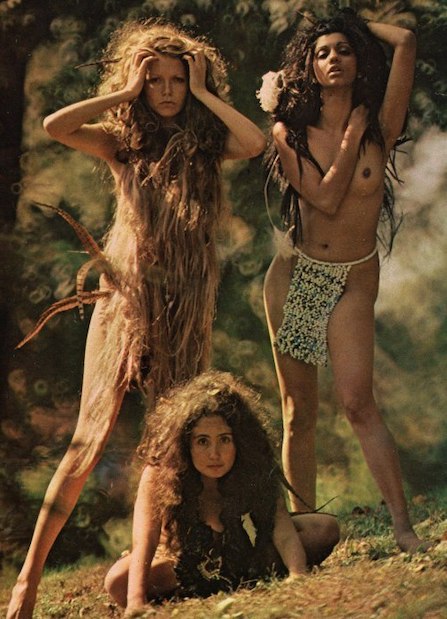Saturday, July 20, 1974
SAVAGES. Written by George W.S. Trow and Michael O’Donoghue. Music by Joe Raposo. Directed by James Ivory. Running time: 106 minutes. Restricted entertainment with the B.C. Classifier’s warning: some nudity.
SAVAGES IS AN AMERICAN movie that was produced by Ismail Merchant and directed by James Ivory, both formerly associated with English-language filmmaking in India.
Their most memorable collaboration was a gentle but incisive film called Shakespeare Wallah, the story of a troupe of English actors whose lives have been spent playing Shakespeare in the Indian provinces.
Moviegoers who recall that film, which starred Siddhartha's Shashi Kapoor as an Indian movie matinee idol, are in for quite a surprise when they see Savages, the team's first U.S. project.
Savages is something else. Perhaps it should be called an allegorical comedy. It could also be called an absurdist parody. Whatever it is, it's new and in large measure the work of an utter madman, screenwriter Michael O'Donoghue.
To fully appreciate O'Donoghue's unique brand of screen insanity, it is necessary to know a bit about his background. Readers of the Evergreen Review will remember him as the author of the incredible Adventures of Phoebe Zeit-Geist comic strip, Barbarella's successor and her superior in every way.
Readers of the National Lampoon will recognize him as a senior editor of that magazine, the creator of some of its most outlandish articles and the project editor behind the Encyclopedia of Humor that so enraged the Volkswagen corporation.
Savages is a film that could have been torn from the pages of O'Donoghue's Lampoon. It opens in an apparently primeval forest.
A title card introduces the Mud People, near-naked hunters who munch narcotic leaves and practice human sacrifice. They are attempting to get on with the business of sacrificing one of their number when a croquet ball rolls into their midst.
"In the forest," reads the title card, "where perfect spheres are unknown, the arrival of a croquet ball raises astonishment." Galvanized into action, the tribesmen set off in the direction from which the ball has come.
In a clearing, they discover a sumptuous, apparently abandoned mansion. They explore it, and gradually take on "civilized" personalities of a recognizably 1920s vintage.
The tribal matriarch (Anne Francine) becomes a grande dame, a powerful hunter (Thayer David) becomes an industrialist, and their intended sacrifice (Sam Waterston) becomes a crippled poet. The interplay of these and other characters suggests that civilization is only another kind of tribal costume, a veneer of convenience.
In developing it as a comedy, O'Donoghue, with co-writer George Trow, plays with audience expectations and underscores social contradictions. When, early in the film, the Mud People capture a Seed Masher (Asha Putli), a title card explains that their behaviour is "as strange to her as it is to us."
And so it is throughout. The film creates its own microcosm and moves along like an ultra-sophisticated, multi-leveled edition of Laugh-In, full of elegant non-sequiturs.
Some of the routines, including a 1920s dance number called “Steppin' on a Spaniel” (an O'Donoghue creation), are convulsively funny. It's performed by Kathleen Widdoes, an actress every bit as vivacious and winning as Judy Garland in her prime.
Others fall flat. On the whole, though, there are more hits than misses, and Ivory's performing troupe is uniformly superb. Just what he's trying to do may be open to some question.
At one point, a character asks what the rules of a particular game are. "It's just a matter of how much you can get away with," is the reply.
Savages, like the works of Woody Allen, Mel Brooks and the National Lampoon itself, will have to search to find its audience. When they meet, though, the union will be a joyous one.
The above is a restored version of a Province review by Michael Walsh originally published in 1974. For additional information on this archived material, please visit my FAQ.
Afterword: What were they thinking? Savages, director James Ivory’s fifth feature film, was an unexpected change of pace for his then 10-year-old Merchant Ivory Productions company. His first five pictures — The Householder (1963), Shakespeare Wallah (1965), The Guru (1969) and Bombay Talkie (1970) — had all been shot-in-India explorations of the Anglo-Indian experience, movies produced by Mumbai-born Ismail Merchant and written by Ruth Prawer Jhabvala. The creative team remained together for 44 years, a partnership that produced 44 films.
Today, the phrase “Merchant Ivory” conjures up a well-mannered, English-accented film genre that offered A-list actors in tales most often set in the Edwardian era. The big screen’s Masterpiece Theatre, it's remembered for such titles as 1984’s The Bostonians, A Room with a View (1985), Howard’s End (1992) and The Remains of the Day (1993). Among these polite dramas, the all-but-forgotten Savages is a surreal outlier, an unhinged comedy that the critical community of 1972 had no idea what to do with. Independently distributed, it took a while to get to Vancouver, and then only for two screenings at the annual Varsity Festival of International Films in 1974. In 2020, the 366 Weird Movies website offered an informative reappraisal appropriate to the celebration of Pandemonium Day.
